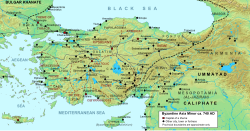Siege of Nicaea (727)
| Siege of Nicaea | |||||||
|---|---|---|---|---|---|---|---|
| Part of the Arab–Byzantine Wars | |||||||
 Map of Anatolia (Asia Minor) in 740 AD. Nicaea is located at the northwestern corner of the Anatolian peninsula |
|||||||
|
|||||||
| Belligerents | |||||||
|
|
|
||||||
| Commanders and leaders | |||||||
| Artabasdos |
Mu'awiya ibn Hisham Abdallah al-Battal |
||||||
The Siege of Nicaea of 727 was an unsuccessful attempt by the Umayyad Caliphate to capture the Byzantine city of Nicaea, the capital of the Opsician Theme. Ever since its failure to capture the Byzantine Empire's capital, Constantinople, in 717–718, the Caliphate had launched a series of raids into Byzantine Asia Minor. In 727, the Arab army, led by one of the Caliph's sons, penetrated deep into Asia Minor, sacked two Byzantine fortresses and in late July arrived before Nicaea. Despite constant attacks for 40 days, the city held firm and the Arabs withdrew and returned to the Caliphate. The successful repulsion of the attack was a major boost for Byzantine emperor Leo III the Isaurian's recently initiated campaign to abolish the veneration of icons in the Empire; Leo claimed it as evidence of divine favour for his policy. The siege of Nicaea marks also the high point of the Umayyad raids, as new threats and defeats on their far-flung frontiers diverted Umayyad strength elsewhere, while Byzantine power gradually recovered.
Following the failure of the year-long assault by the Umayyad armies on the Byzantine capital Constantinople in 717–718, a short period of peace followed as the Umayyads licked their wounds, suppressed the rebellion of Yazid ibn al-Muhallab and re-assessed their priorities. When warfare on the Arab–Byzantine frontier recommenced in 720, the strategic focus of the Caliphate had shifted away from outright conquest. The Muslim raids across the Taurus Mountains into Byzantine Asia Minor still occurred regularly every spring and summer, sometimes accompanied by naval raids and followed by a winter expedition; they devastated large tracts of Asia Minor, and destroyed several fortresses; but the Arabs did not attempt to hold on to captured strongholds on the west side of the Taurus Mountains. Byzantine reaction during these years was passive, as the Empire still nursed its strength against the vastly superior resources of the Caliphate. The Byzantines did not obstruct or confront the raiding Arab armies, but rather retreated to well-fortified positions scattered throughout Asia Minor.
...
Wikipedia
